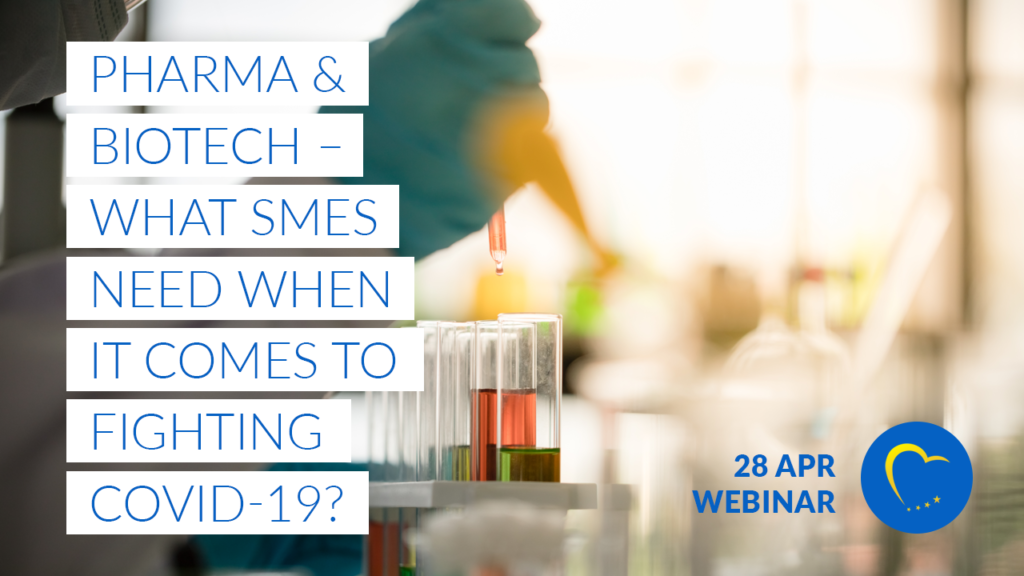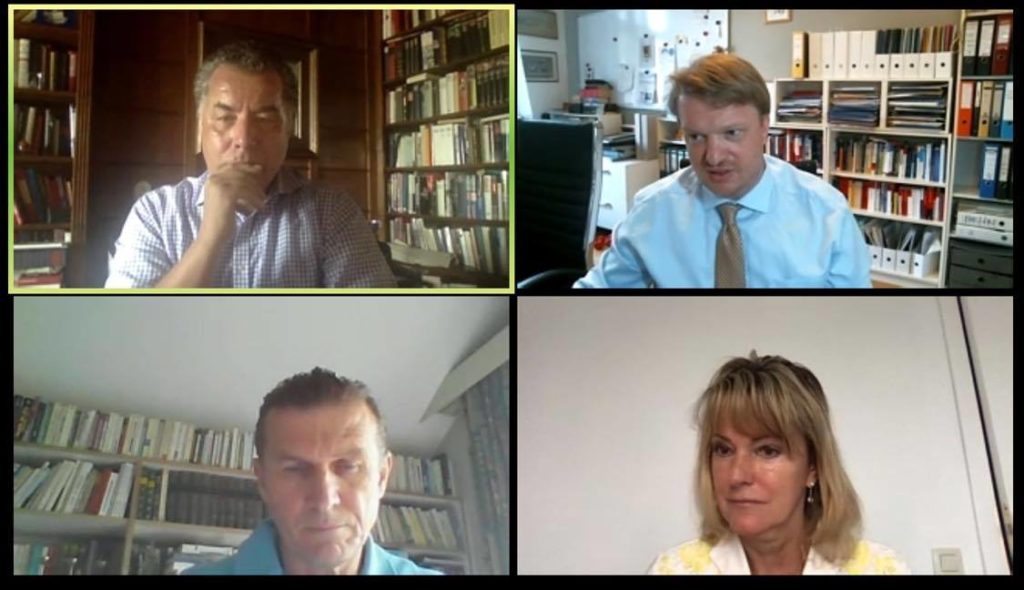Pharma & BioTech –
What SMEs need
when it comes to fighting COVID-19?

On Tuesday April 28, 2020, SME Europe in cooperation with SME Connect hosted a Webinar titled “Pharma & Biotech – What SMEs need when it comes to fighting COVID-19” in order to discuss the COVID-19 crisis, its impact on Pharma & BioTech SMEs to combat the outbreak and what is needed from their side.

The Webinar showcased high-level Pharma & BioTech associations such as EUCOPE, EuropaBio and GIRP. Christian Ehler MEP, ITRE Committee and Vice-Chair STOA hosted the webinar and welcomed panellist such Alexander Natz, Secretary General EUCOPE; Bernhard Grimm, Director Healthcare BioTech EuropaBio and Monika Derecque-Pois, Director General GIRP.
If we tackle big challenges, we need big money.
Christian Ehler, Member of the European Parliament
Christian Ehler MEP, Rapporteur for the next EU Research Programme Horizon Europe, opened his welcome speech by addressing the challenges the EU is facing. The pharmaceutical sector is lacking a full range of financing possibilities such as interest funds to understand the specific needs of Pharma & BioTech companies. Moreover, the EU is underfunded when it comes to R&D in Pharma & BioTech sectors compared to other sectors in Europe. This results inevitably in different national regimes without a coordinated European functional response. “The pharmaceutical sector is extremely risky, time-consuming and requires a lot of money for R&D.” “If we tackle big challenges, we need big money.” But we are lacking a fund specifically dedicated to the needs of pharmaceutical companies and their SMEs. We need to learn lessons from this pandemic and put funds in place for the future.
An increase in production cannot be done overnight.
Alexander Natz, EUCOPE
Alexander Natz aconfirmed that funding for research is vital to find a vaccine against COVID-19 and contain the spread of the virus. Therefore, the initiatives by the European Commission are much welcome to fight COVID-19 and support Pharma & BioTech SMEs. However, there is more to be done when it comes to funds and financing in Europe.
To overcome the crisis, the focus should now lie within clinical trials, to keep them going, also in times of crisis. The pharmaceutical sector is key to find a vaccine in order ‘to get back to normal’. But, a stronger progress and process in regulatory measures is needed. “We need to know what the regulatory vehicles are to get those treatments into the market faster.”
This crisis has also shown us to bring back production to Europe to avoid product shortages through export restrictions from the East, as the sector heavily depends on production from India and China, Natz clarified. It is vital to think future-oriented and problem based. A factor to keep in mind however, when thinking about bringing back production to Europe, is that production costs compared to India or China will be different and much higher. This will take time, “an increase in production cannot be done overnight.”
Concluding, Natz stressed on fighting in solidarity. In doing so, the European Commission, has launched an EU COVID-19 data platform, where results and data can be shared to avoid re-making mistakes in R&D in the Pharma & BioTech sector.
We need to create a post COVID-19 eco-system that is fit for the long-run. The stronger this eco-system, the better we can master the next crisis.
Berhard Grimm, EuropaBio
Bernhard Grimm contributed to the debate by looking at the Pharma & BioTech industry as a whole eco-system. “We believe that the BioTech industry will contribute to the solution of this pandemic, but all minds need to be put together in order to find a solution. The question is not if but when a vaccine will be found.”
At this point, Pharma & BioTech SMEs need continuity of treatments and clinical trials, when it comes to fighting COVID-19, he stated. Shot-term risks for SMEs, such as interruption of clinical trials, delaying trials or the results should be avoided as smaller enterprises will be hit hard (‘cash is burning’). The future industrial strategy/life science strategy should be in favour of small companies, as we need to have strong SMEs in the sector. To visualize the importance of SMEs, he gave the example of R&D in cancer and rare diseases, where around 70% of solutions come from SMEs. “We need to create a post COVID-19 eco-system that is fit for the long-run. The stronger this eco-system, the better we can master the next crisis.”
We need to learn the lessons from this pandemic to understand how much we depend on solidarity between Member States
Monika Derecque-Pois, GIRP
Monika Derecque-Pois explained that the crisis has put forward several challenges for full-service healthcare distributors in Europe. The surge in demand was three times higher for healthcare products, healthcare distributors are not everywhere classified as critical infrastructure, export restrictions and border controls were put in place, although the sectors heavily depend on the global supply chains from outside the EU, which resulted in shortages of COVID-19 products especially those used in emergency units. “But, our sector has shown its resilience in crisis.” We need to learn the lessons from this pandemic to understand how much we depend on solidarity between Member States, and to be better prepared in the future.

